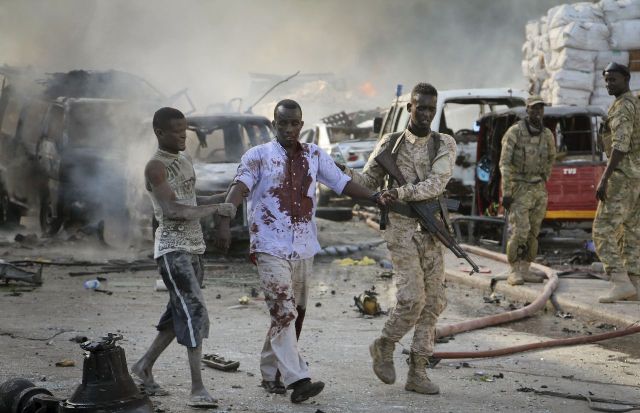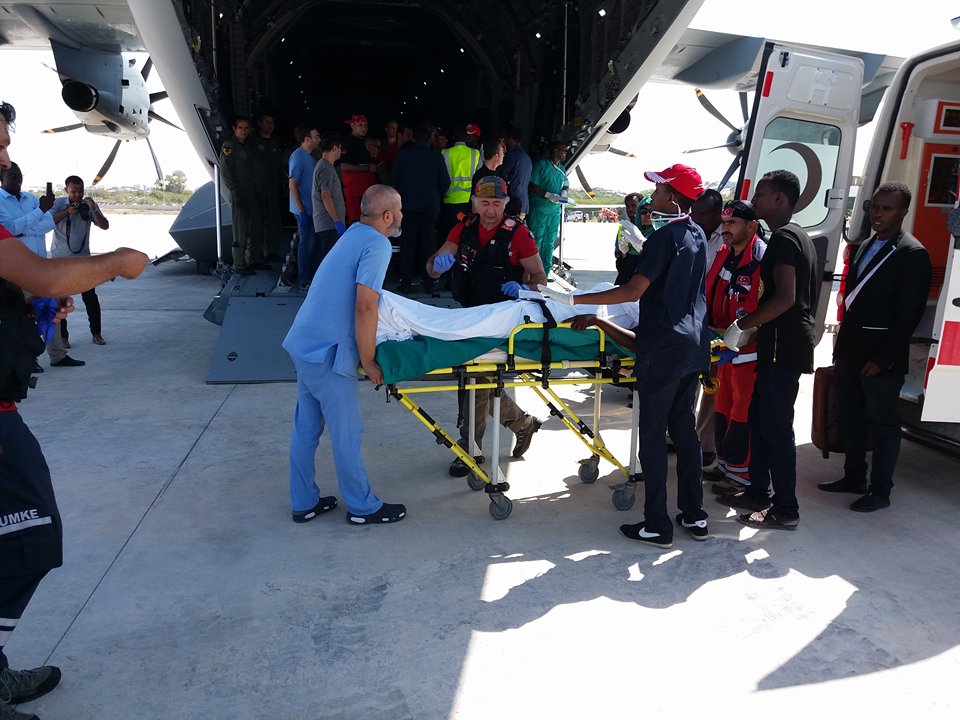OCTOBER: Why it should be a watershed moment for Somalia


By M.A Afrah
For nearly three decades the state of Somalia is experiencing a protracted conflict in which over the years has seen the conflict evolve and go through several phases. In the last decade however, the latest stage of this conflict which is between the federal government of Somalia and radical extremist group Al-Shabab that has resulted into devastation, destruction and tragedies the likes of which have never been heard of in Somalia’s history especially during the past three decades of conflict.
This is mainly because of the brutal tactics used by the radical extremist group alshabab (suicide bombings and indiscriminate killings) and this brutal tactic was at display on October 14 Saturday afternoon – a day that will forever be etched in the hearts and minds of Somalis when a truck loaded with explosives was detonated in the busy junction of KM5 claiming the lives of about 400 people and injuring more than 300 others. October 28 another deadly attack by Al-Shabab targeted hotel Nasa Hablood II claiming the 29 lives among them prominent politicians.
The radical extremist group Al-Shabab was quick to assume responsibility for the 28th October attack but not for the tragic event of 14th October. The group previously used this brutal tactic of suicide attacks and it has largely been their trademark but not the scale witnessed 14th October
RETHINK OF NATIONAL SECURITY
The federal government of Somalia lacks a comprehensive national security strategy and it is not a fault of their own since the process of state-rebuilding is at early stages. But whatever little strategy the FGS employs seems not work in terms of yielding positive results hence requiring overhaul or rethink of national security strategy.
The fight against Al-Shabab is currently on a pause mode. The last major offensive mounted against them was under the last FGS in a operation dubbed ‘Indian Ocean’ in which the main aim was to liberate towns under their control which the biggest being their de facto capital Baraawe and the operation resulted limited success. Since then the current FGS is yet to follow up with similar strategic initiative aimed at eradicating Al-Shabab although they must initiate one after the tragic events of 14th October.
The FGS though facing a lot pressure from the general public to respond to the barbarity of Al-Shabab must take time to produce bullet proof strategy against Al-Shabab, not to rush and produce a half baked strategy.
Currently there are huge areas of ungoverned territories in Somalia largely in southern Somalia that have given Al-Shabab license to roam freely and continue to exist in order to senselessly murder civilians and hamper efforts of rebuilding Somalia. FGS must start to mount a major offense against these extremist fighters to reclaim territories that are currently under their control and eliminate them totally.
The FGS has been widely accused of misdirecting their political capacity, focusing on secondary issues like the internal politics of federal member states (FMS) rather than on primary issues like national security. Going forward they must direct all their political and economic capacities into national security. The key area of focus being the rebuilding of Somalia’s national army which is currently underfunded and ill-equipped. They are the surest way to neutralize this immense threat posed by Al-Shabab. The government must also improve coordination and cooperation among security organs and personnel.

For the past decade, a primary actor in the security structure of Somalia is Amisom. FGS must critically review the mission and see if it’s fit for purpose. Many in Somalia believe Amisom takes precedence over Somalia’s national army (SNA) especially in economic support from the international community. For instance, a soldier of Amisom is ten times remunerated than the average SNA soldier and many in Somalia are of the believe that the international community must increase its support for the SNA because it’s the only strategically viable solution to this problem of Al-Shabab.
In the long term, there is growing frustration and anger against Amisom especially by the local population who accuse them of incompetency, corruption and indiscriminate use of force although the same can be said about SNA. Regardless, these are serious accusations which the FGS must address in order to win the support of local population.
FGS must assume responsibility especially the security organs and personnel regarding the tragic events of October 2017 because the buck stops with them and they are not immune from assuming responsibility. This, even though immunity from responsibility is a norm in Somalia’s politics and that must change now.
Early indications are that FGS is heading towards the direction of assuming responsibility about the events of October 2017 by sacking both the intelligence and police chiefs but those dismissals seem to be a cosmetic change and do not address the absolute failure of the FGS national security strategy. A wholesale change is needed in the entire security structure of Somalia.
The security organs of FGS such as the national intelligence and security agency (NISA) must produce a detailed comprehensive report answering critical questions like what happened and also highlight their failure in regard to counter-terrorism strategy and solutions needed to overcome those obvious failures.
FINALLY UNITY
It’s no secret for the past 3 decades that Somalis have been divided along ethnic lines and it has had a profound negative impact on society and politics to a point ethnicity became a foundation of Somalia’s political system (4.5).
In the current political setting of Somalia, ethnic interest takes precedence over national interest. Under normal political setting, it’s the other way round. For nearly 2 decades, Somalia has been experimenting ethnic based politics to no success only resulting in more divisions and grievances among the Somali society. Albert Einstein classic definition of insanity seems to be the perfect description of Somali’s politics- doing the same thing over and over again and expecting a different result.
The two October 2017 tragedies finally provides a window of opportunity in which national interest takes center stage among them being the fight against Al-Shabab.
FGS currently has untapped political capital as result of October tragedies, the biggest among them is the Somali population. Rage and anger is can be felt among Somalis both home and abroad. They showcased a whole new positive side of Somalia’s population, a patriotic one challenging the negative narrative that was “Soomaalinimo-Somalism” is dead.

The Somali population has finally realized their enemy which is Al-Shabab and the FGS must take full advantage of the morale awakening of Somali people in order to win their support and legitimacy by providing the necessary political direction needed. In the past and still now, a huge gap exists between the government and the governed. The Somali people have always viewed their government as a foreign entity and it’s not their fault because the past different administrations have made little or no effort to win their support but that must change now. The fight against [Al-Shabab] has now become a national cause in which the Somali population can rally around henceforth bringing UNITY- the elusive thing Somalia has been looking for the past three decades.
Political unity is of utmost importance now. FGS must refrain from meddling in the internal politics of federal member states. Already accusations are flying left and right about the FGS instigating political instability in FMS and the most widely known case being Galmudug state where an impeachment of state president Haaf almost escalated the situation to full-scale conflict because of the ethnic actors involved in the situation.
In the just concluded conference in Mogadishu which was between FGS and FMS, the government at least attempted to mend fences with the political actors of Federal Member States which is a good move by the government. Political division is not viable option at this moment because the nation is facing tougher tasks and one of them is the fight against Al-Shabab which requires comprehensive political unity among political actors.
History normally provides few watershed moments but when it does, the course of events is changed forever and the double tragedies of October 2017 especially the one on the 14th truck bomb is such a moment but the onus is on government to take advantage of these tragedies and transform them into positive outcomes going forward.
The writer is a Mogadishu based political analyst
Email:- [email protected]